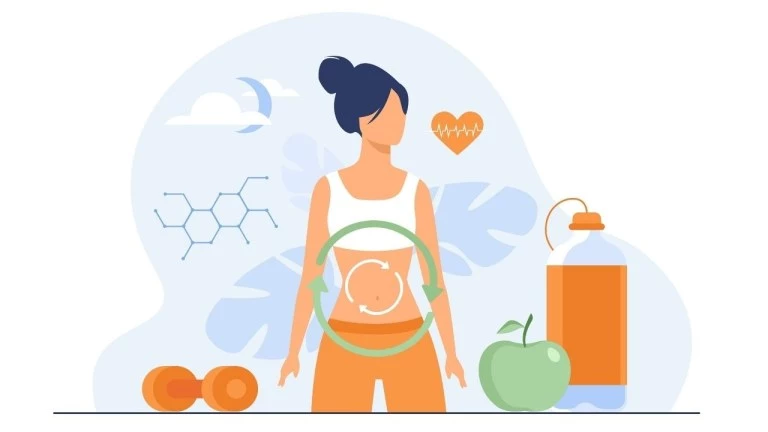Best Healthy Food for Pregnancy and its Importance in 2022
As a mom-to-be, you may have many questions in your mind like what is healthy food for pregnancy? Which nutrients are good for my baby’s growth? Which foods provide me the essential nutrients? How much weight should I gain? etc. I think you will get satisfactory answers in this blog.
A well-balanced diet is important for the good health of both mother and baby. You feel increased appetite and strange carvings in this period. Unhealthy food or eating pattern is risky during pregnancy and it also affects the growth of baby.
Why healthy food is important during pregnancy?

Pregnant women should eat a variety of foods in certain quantities and proportions to get all the required nutrients in the required amount.
Importance of healthy food
- Growth and development of the fetus
- It reduces pregnancy complications like gestational diabetes, hypertension, etc. Eating healthy food keeps your weight, blood pressure, diabetes, etc. under control.
- You can minimize your pregnancy symptoms like nausea, vomiting, constipation, heartburn, etc. by choosing the right food.
- A pregnant woman is at high risk of many infections. Healthy food improves the immunity of both mother and baby and keeps them away from diseases.
How much should I eat during pregnancy?
When you are pregnant, everyone advises you to eat for two. But it doesn’t mean you should double your calorie consumption. There is a need for extra energy but it is not very high. But of course, the need for other nutrients like protein, vitamins, minerals, fiber, etc increases during pregnancy.
As you know, there is no one size fits for. The daily requirement of nutrients depends on your working pattern, weight, or body mass index. If you are undernourished, you have to gain more weight during pregnancy and if you are overweight or obese, you have to gain weight less than a normal pregnant woman. It also changed if you have twins or multiple babies.
Also, there is a need to modify your diet or restrict some foods if you have diabetes, hypertension, or any deficiency.
How much weight gain is healthy in pregnancy?
Here weight gain recommendations are given in below table
| Before pregnancy BMI | Health Condition | Gain weight (For one baby) | Gain Weight (For Twins) |
| Less than 18.5 | Underweight | 28-40 pounds | 50-62 pounds |
| 18.5- 24.9 | Normal | 25-35 pounds | 37-54 pounds |
| 25.0- 29.9 | Overweight | 15-25 pounds | 31-50 pounds |
| 30.0- greater | Obese | 11-20 pounds | 25-42 pounds |
Reference: https://www.cdc.gov/reproductivehealth/maternalinfanthealth/pregnancy-weight-gain.htm
What are the key nutrients, their roles, and their sources?
Healthy food for pregnancy should contain a variety of foods in a certain amount so that the nutrients requirements like carbohydrates, fat, proteins, vitamins, minerals, and water of mother and baby are fulfilled.
Here I am explaining key nutrients like Protein, Carbohydrates, Fats, Calcium, Vitamin D, Folate, Iron, and Vitamin C.
Protein
Role of protein:
- It is important for the growth of skin, muscles, hair, and other tissues of the baby
- It develops the immune system by making antibodies.
- Hormones and enzyme production in the body.
Sources:
Lean meat, chicken breast, eggs, fish, dairy products, legumes and pulses, seeds and nuts, soy products, etc
Try to eat a variety of protein sources on daily basis to get different types of essential amino acids.
Carbohydrates
Role of carbohydrates:
- It provides energy to the pregnant woman and baby.
- Fibre- complex forms of carbohydrates are useful in maintaining the health of the digestive system and prevent constipation during pregnancy.
- Pregnancy may cause fatigue; carbohydrates provide instant energy.
- Eating carbs in the morning is useful for combating morning sickness and nausea.
Sources:
Carbohydrates are available in different forms- simple sugar and complex form of starch and fibre.
Some carbohydrates broken down easily into glucose and increase blood sugar, these are called higher glycaemic index foods. The lower glycaemic index foods are considered healthier than higher GI foods.
Simple carbs present in fresh fruits and vegetables, milk, and milk products like curd, cottage cheese are considered a healthy option.
Whole grains products, millets, legumes, oatmeal, sweet potatoes, corn are some examples of healthy complex carbs.
Fat:
Role of fat
- Brain, eye, and nervous system development of the baby.
- It is a healthy carrier of fat-soluble vitamins like A, D, E, and K.
- It also provides the energy.
Sources:
There are good and bad fats. Bad fats (Saturated and Trans-fat) are responsible for excess weight gain and heart diseases.
Unsaturated (monounsaturated and polyunsaturated) fats are healthy fat. Olive oil, avocadoes, nuts and nuts oil(almond), nut butter, sunflower oil, dark chocolate, egg, oily fish like Salmon are examples of healthy fat.
Calcium
- Growth of strong bones of the baby
- It reduces chances of pre-eclampsia, low birth weight
- It is important to run circulatory, nervous, and muscular systems properly.
Sources:
Milk & milk products like cheese, yogurt, Dry fruits and seeds (almonds, sesame, Gingelly seeds), vegetables (ladyfinger, spinach), millets (finger millets), fish (sardines)
Calcium Supplements: It is given in many developing countries where the calcium requirement of the body is not completed by the diet. In developed countries also, healthcare professionals prescribe supplements to the pregnant woman who is not getting enough calcium from food.
Vitamin D
Role of Vitamin D:
- It is important for the absorption of calcium and phosphate which are important for bone, teeth, heart, and nervous system development.
- It is important for immune function and brain health
Sources:
Sunlight: Our skin produces Vitamin D in the presence of sunlight. Exposure to sunlight when the sun is at the highest level is more beneficial for the production of vitamin D.
Egg, oily fish (Salmon, Sardines), liver are the richest sources.
Fortified foods: Many foods like breakfast cereals, cooking oils, fat spreads, milk, and milk products are fortified with Vitamin D.
Folate or Folic acid
Role of Folate:
- It plays important role in the production of red blood cells. It is important to form a neural tube of the baby in the early stage of pregnancy and then develop it into the brain and spinal cord.
- It prevents some major birth defects of the baby’s brain and spine.
- It protects your baby from cleft lips and palate, premature birth, low birth weight, etc.
Sources:
Fruits and vegetables especially broccoli, spinach, lettuce, sweet corn, grapefruits, oranges are good sources of folate, Lentil, beans, eggs, and fortified foods like breakfast cereals are also good sources of folate.
Folate supplements along with a folate-rich diet are recommended for pregnant women to fulfil the requirement of this vitamin.
Iron
Role of Iron
- Iron is useful for making extra blood(haemoglobin) for you and your baby.
- It is helpful to transfer oxygen from the lungs to the rest of your body parts and your baby.
- It prevents anaemia which is one of the causes of low birth weight and premature babies.
Sources:
Poultry, fish, lean red meat, fortified breakfast cereals, beans, peas, vegetables like spinach, broccoli
Dried raisins, peaches, and prunes, almonds, pistachios, etc.
Vitamin C
Role of Vitamin C
- It is needed to make collagen that builds the baby’s body.
- It develops a healthy immune system for the mother as well as the baby.
- It helps in the absorption of iron which prevents anaemia.
Sources:
Citrus fruits like orange, lemon, guava, amala, vegetables like broccoli, tomatoes, potato, red pepper, cauliflower, etc.
You don’t need to take the supplement for Vitamin C. It is abundantly present in fruits and vegetables.
What to eat when you feel pregnancy symptoms?
During pregnancy, you may suffer from morning sickness, diarrhea, constipation, and heartburn, etc. Here are some food tips to get rid of it.
Morning Sickness (feeling of nausea and vomiting): Eat dry crackers/ toast before getting out of bed. Avoid spicy, greasy, fried foods. Ginger in a small amount is also helpful, you can drink ginger tea or ale. Eat small and frequent meals throughout the day instead of heavy, infrequent meals. Avoid lying down after eating a meal.
Constipation: Eat more fibre rich foods like fruits and vegetables. Instead of fruit juices, eat the whole fruit. Prunes, pears, and apples have a laxative effect and are helpful to get relief from constipation. Drink 6-8 glasses of water per day.
Diarrhea: Eat pectin and gums-rich foods like banana, white rice, oatmeal, etc. Drink coconut water or homemade ORS to avoid dehydration in the body.
Heartburn: Limit caffeinated foods and beverages, carbonated beverages. Avoid eating spicy and oily foods. Eat small portions at frequent intervals throughout the day.
Quick tips for eating healthy food for pregnancy
- Don’t forget breakfast. Try to make it larger than lunch and dinner.
- Add a variety of locally available and seasonal fruits and vegetables to your diet.
- Add all the food groups to your diet to get all the nutrients.
- Take small meals at frequent intervals to avoid bloating and nausea.
- Try to make homemade, healthy versions of snacks for your carvings.
- Check a list of foods to be avoided during pregnancy in our blog’ Foods to avoided during Pregnancy’
- Avoid unwashed, raw, half-cooked foods and allergic foods (if you have any food allergies) during pregnancy.
- Wash your hands with soap and water before and after eating before preparing food after using the toilet to avoid contamination.
Read More:
FAQ:
Q. What is the calorie requirement during each trimester of pregnancy?
Ans. In the first trimester (first 12 weeks), most women don’t need extra calories. In the second Trimester(13-26weeks), base calories (as per the lifestyle pattern) plus extra 340 calories are required per day. And in the third trimester (after 26 weeks), base calories plus extra 450 calories are required per day.
Q. What are the different food groups which provide nutrients to us?
Ans. Foods can be categorized according to the function as- 1. Energy-rich foods (Carbohydrates and fats) include whole-grain cereals, millets, vegetable oils, ghee, nuts and oilseeds, and sugars. 2. Bodybuilding foods (Proteins)- Pulses, nuts, and oilseeds, milk and milk products, meat, fish, poultry. 3. Protective foods (Vitamins and minerals) – Green leafy vegetables, other vegetables, fruits, milk and milk products, egg and flesh foods.
Q. Can I get all the required nutrients by following a vegetarian diet during pregnancy?
Ans. Yes. You and your baby can get all the nutrition from a vegetarian diet. Add a wide variety of healthy foods to your plate and ensure to get enough protein from legumes, dairy products, and vegetables, etc.
Q. Is there any side effect of iron supplements during pregnancy?
Ans. Iron supplements can make you constipated. Add fibre-rich food to your diet. Drink 6-8 glasses of water daily. Do the exercise as recommended by the doctor.






